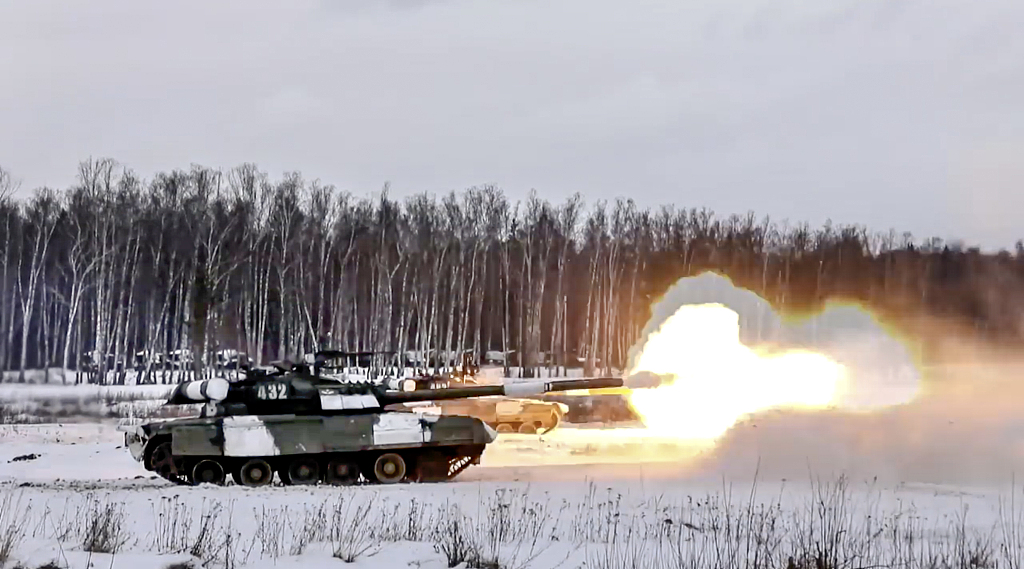
Ukrainian serviceman of the 30th Army Brigade seen outside Svitlodarsk, Ukraine, January 23, 2022. /VCG
Ukrainian serviceman of the 30th Army Brigade seen outside Svitlodarsk, Ukraine, January 23, 2022. /VCG
Editor's note: Wang Jin is a research fellow at Charhar Institute and an associate professor at China's Northwest University. The article reflects the author's views and not necessarily those of CGTN.
The crisis between Russia and Ukraine has attracted global attention. Both countries have amassed troops along the border in the past weeks, increasing the fears of an imminent war between Russia and the West.
For Russia, a full-on war with Ukraine could lead to more challenges than benefits. Following the Ukraine crisis of 2014, Russia expanded its influence in Ukraine's eastern Luhansk and Donetsk cities, while securing its annexation of Crimea by military presence.
However, any further possible military influence of Moscow in Ukraine faces challenges: Russia is not able to control or influence areas outside Donetsk, Luhansk and Crimea due to the presence of strong Ukrainian military forces and local people's nationalist sentiments, while it is also threatened by more sanctions from Washington. After the 2014 crisis, Washington's sanctions on Russia have put economic pressure on the country. Washington has repeatedly warned in the past weeks that once a war erupts between Russia and Ukraine, more sanctions could be imposed on Moscow. Therefore, Russia's war with Ukraine seems to be too costly.
To maintain its presence in Donetsk, Luhansk and Crimea, Moscow could help win over the concessions from both Ukraine and other European states. Although both Luhansk and Donetsk established their local authorities after 2014 and pledged to become part of Russia, Moscow never accepted the pleas. From Moscow's perspective, it is highly necessary to earn leverage over Ukraine at a cost it can bear. A full-on war means expanding occupation areas in Ukraine, which will be difficult for Russia to maintain. Instead, punishing and subduing Ukraine by setting up separatist forces in Eastern Ukraine seems more plausible. Against this backdrop, Moscow does not need and does not want to further provoke war against Ukraine.
In addition, launching a war against Ukraine could lead to Moscow's loss of strategic bargaining chips against NATO. Moscow wants to force the West to sit down and promise to secure Russia's strategic sphere in Eastern Europe to stop further eastward expansion of NATO. Since 1991, the gradual but consistent eastward expansion of NATO threatens Russia's national security and strategic interests, and Moscow hopes to force the West to engage seriously with Moscow to discuss European security by establishing a new mechanism. Although Ukraine could not be accepted into NATO given Kyiv's tensions with Moscow, Kremlin worries about the possibility of U.S. deployments of missile and other strategic weapons inside Ukraine. Therefore, for Moscow, the crisis with Ukraine could be maintained but not escalated to a total war, with an aim to help reach agreements with the West to suspend U.S. deployment of intermediate-range ballistic missiles in Europe and limiting military presence and exercises along Russia's borders.

Russian T-72B3 tanks during military drills at the Golovenki training ground near Moscow, Russia, February 2, 2022. /VCG
Russian T-72B3 tanks during military drills at the Golovenki training ground near Moscow, Russia, February 2, 2022. /VCG
As far as Ukraine is concerned, launching a war against Russia seems impossible as Kyiv's military forces are incapable of resisting the Russian military offensive. After its independence in the 1990s, Ukraine's military capabilities shrank significantly, and it is difficult for Kyiv to amass a large amount of army with enough capabilities to resist the offensive from Moscow.
Although Ukraine has shown the world its desire and morale to resist possible attacks from Russia – and always seeks retaking of Donetsk, Luhansk and Crimea – Kyiv understands that it is nearly impossible to realize the aims within the short term. To launch a war against Russia might lead to more battlefield and territorial losses for Ukraine.
Neither Russia nor Ukraine wants war. Ukraine has little hope to win a total war with Russia, while Russia's total war with Ukraine could push Kyiv further into the Western camp, which is against Moscow's strategic targets in Eastern Europe. To keep the "cold peace" along the frontline with each other and continue communication under assistance from France, Germany and even Turkey, are accepted by both Russia and Ukraine.
Given its leading role in NATO, Washington's promise of security to Russia and its serious talks over missile and military deployments in Russia's neighboring states are important to settle the crisis in Ukraine. A new form of Helsinki Accords that establish a firm basis for the security of all European states could lay the foundation for decades of peace in Europe, including Russia and Ukraine.
The tensions between Russia and Ukraine could be pacified only when Moscow reaches strategic agreements with the West, especially the United States. Neither Russia nor Ukraine wants war, and the key to peace is in the negotiation table between Moscow and Washington.
(If you want to contribute and have specific expertise, please contact us at opinions@cgtn.com.)

